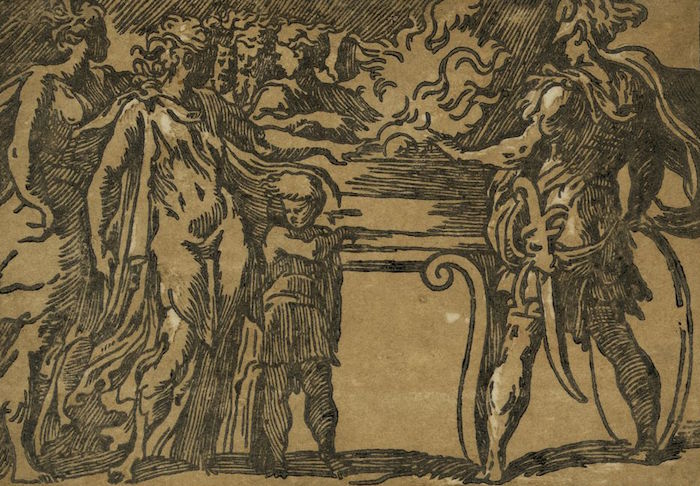An Ottonian chronicler in the 11th century A.D. recorded an odd ghost story in the town of Deventer, in the modern-day Netherlands. In it, a band of ghosts ignore the sacred power of a Catholic priest and do him great harm. The story’s a good one in its own right, but it’s also a great plot hook: dealing with some ghosts that don’t follow the normal rules for spectral behavior.

Most medieval European ghost stories are pretty dull: monk notices ghost, ghost says “I am in Hell, please pray for me,” monk prays for ghost, ghost returns to thank monk and says that heaven is great. But Thietmar, Prince-Bishop of Merseburg (975-1018), includes a very different sort of ghost story in his otherwise-historical Chronicon Thietmari.
The story begins with Bishop Baldric of Utrecht (897-975) noticing that a church in Deventer has become so tumble-down it’s unusable. So he repairs the church, consecrates it, and gives it to a priest. One morning before dawn, the priest sees a band of ghosts singing and making offerings in the church! He tells the bishop, and Bishop Baldric orders the priest to sleep in the church. The priest tries, but the ghosts are furious! They pick up his bed – with the terrified priest still in it! – and throw it out into the street.
When Bishop Baldric hears about this, he orders the priest to try again, but this time well-armed with saints’ relics and holy water. The priest does what he’s told, and the ghosts are even angrier. In the middle of the darkened church, they pick up the priest, place him in front of the altar, set him on fire, and watch him burn until only ash remains. Plainly these ghosts have no respect for sanctified ground, saints’ relics, holy water, or the sacred person of a priest.
The question is: why do these ghosts work differently? In Thietmar’s head, these were probably ghosts of pagan Slavs. Even though there weren’t (as far as I can find) Slavic settlements in the Netherlands, Thietmar was writing in the Duchy of Saxony, which bordered Slavic lands. For him, paganism and Slavic religious traditions were likely synonymous. Given that Slavic paganism had a number of fire-related rituals, small wonder that Thietmar had his anonymous priest burned alive. In this instance, Christ had no power over the souls of pagans.

Prince-Bishop Thietmar’s ghost story is an obvious call to action for an adventure in a fantasy RPG. Your NPC based on Bishop Baldric comes to the PCs and explains that he’s having trouble with ghosts that don’t follow the normal rules. They even murdered a priest! Lit him on fire in his own chancel! Baldric is ready for some professionals to step in.
In your campaign setting, you probably don’t have to deal with the ambiguity of what-kind-of-pagans-are-they. Find an unorthodox, heretical, or ancient faith appropriate to the place you want to set the adventure, and have the ghosts be from that religion.
Players are likely to deduce (correctly) that these ghosts are resistant to normal faith-based powers: turn undead, exorcisms, the works. Finding out what will work requires figuring out why the normal powers won’t. PCs may investigate the burning ritual, ask questions of a troublesome local neopagan, or consult the town archives. Of course, every good adventure needs some complications. Maybe your version of Bishop Baldric gets upset at the PCs’ investigation of pagan alternatives. He commands them to stop, so they have to do it sneakily. Or maybe the priest’s replacement refuses to permit the party’s heathen nonsense in his new church. There may even be a Slavic-themed monster allied with the ghosts who tries to interrupt the party’s investigation, perhaps Poludnitsa or a Dhampir.
When determining what solutions actually work against these ghosts, pick something appropriate for the religion you chose for them. A cursory check of the nuttier side of the Internet suggests Slavic protections against evil spirits may include boiling water, wild celery root, caraway seeds, purple loosestrife, and/or wormwood. I also think milk, salt, and silver fit thematically with Bishop Thietmar’s story. In your customized list of remedies appropriate for your setting, include substances that are harmful to the ghosts, substances the ghosts will shy away from, and reagents or words that will break any spells the ghosts cast. If the PCs try to go up against the ghosts without the aid of these remedies, it should be a real tough fight, maybe unwinnable!
Do you have thoughts about medieval ghosts, Slavic ghost repellant, or fantasy ghost adventures in general? Have you ever tried something like this? Come tell me about it over at the Facebook page!






